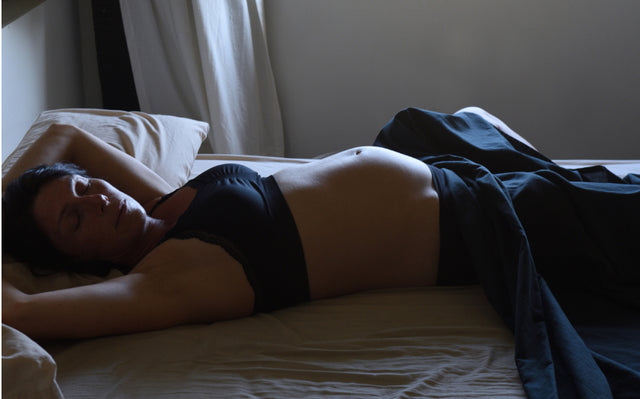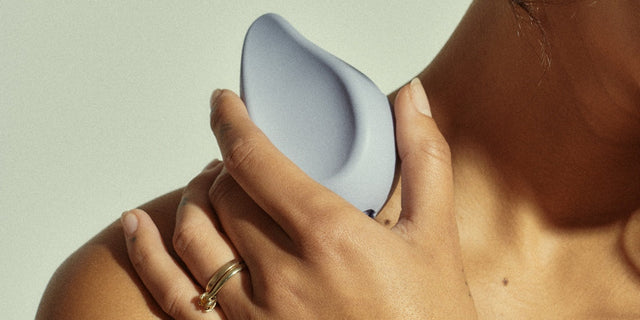Night sweats with pregnancy: stay cool while expecting
Pregnancy is an exciting journey marked by an orchestra of changes within your body. Between the growing belly and the fluttering kicks, it’s common to find your internal thermostat cranks up, leaving you hot and sweaty while trying to catch z’s.
If you're experiencing night sweats with pregnancy, this guide is for you. Together with Dr Andrea Huddleston, an expert in women’s health and natural fertility, we explore why we sweat when expecting and what you can do to reclaim some much-needed sleep.
Sweating in pregnancy: causes and symptoms
From the magical moment of conception to the grand finale of delivery (and beyond), night sweats can show up at any stage of pregnancy, leaving you feeling damp and uncomfortable. Chances are, no matter how low you set the AC at night, you’ll still find yourself in a sweaty situation, but why?
Shifting hormones
Sweat often cosigns the lease when there's a tiny tenant in your belly. There are many reasons why this happens, and it's no surprise that hormones are involved. As hormones like estrogen and progesterone fluctuate to accommodate your growing baby, it can cause a surge in your resting body temperature, making you feel warmer during the day and at night.
“Your temperature will increase with ovulation, and then progesterone will increase dramatically and exponentially,” Dr Andrea says. She estimates that night sweats occur in around 30% of pregnant people, and it’s “usually in that first trimester when progesterone levels help to nourish and support your developing embryo until the placenta takes over at 12 weeks.”
From there, the placenta continues to produce progesterone, which greatly impacts thermo regulation, to support your baby’s growth. Hello, night sweats in early pregnancy.
Increased blood flow
During pregnancy, your blood plasma volume surges up to 40% higher than pre-pregnancy levels and continues rising into the third trimester. This vital surge helps to power your heart while nurturing your baby with oxygen and nutrients, but the downside is that it can leave you feeling like you’re on an endless tropical holiday.
Medication side effects
Many drugs can cause sweating at night time. From cold and flu remedies to supplements and antidepressants, something you regularly take could affect your body temperature. Chat with your care provider if you use ondansetron (Zofran) to manage pregnancy nausea and experience regular night sweats.
Blood sugar levels
Experiencing night sweats due to low blood glucose could hint towards gestational diabetes, though this condition is usually asymptomatic. If you feel like your blood sugar is dipping, chat with your GP and ensure you get tested within 24 and 28 weeks of pregnancy.
Snacking at night? A late-night carb feast might seem innocent (and satisfying), but it can mess with your blood sugar levels and set off an encore of night sweats. Opt for low-carb options instead.
Infections or illness
While your body is busy doing its best baby-growing work, it becomes immunocompromised, leaving you at a higher risk of falling ill. Pregnancy night sweats can be a sign of a more serious infection, so see your GP if sweating persists or worsens.
Thyroid dysfunction
An overactive thyroid, known as hyperthyroidism, can nudge its way into the night sweats narrative but is generally only an issue when other symptoms of thyroid dysfunction are present.
The good news is that pregnancy night sweats tend to reach their expiration date soon after childbirth as your body gradually adjusts to its pre-pregnancy state. In the meantime, let’s explore what you can do to turn down the heat and enjoy your slumber.
Pregnant and sweating at night: how to beat the heat
If night sweats during pregnancy are ongoing, here are some tips to manage the moisture and get better sleep.
- Practise good sleep hygiene by adjusting your sleep environment and pre-sleep routine.
- Stay hydrated during the day, even if it means more trips to the loo!
- Play with the AC to keep your room cool.
- Opt for a lighter, moisture-resistant mattress protector and cooling sheets.
- Wear light pyjamas made from natural, breathable materials.
- Snack on digestible options instead of consuming carbs before bed.
Dr Andrea suggests a combination of warm showers (to divert blood flow) and controlled breathing can also help. “Some studies show that box breathing (or parasympathetic breathing) can reduce night sweats by about 40%,” she says.
Moisture-wicking magic: it’s our jam
Our innovative range of moisture-wicking underwear and sleepwear has your back when things get sweaty while you’re expecting. They’re great for pregnancy-related discharge too.
Pair a breathable ModiCool™ T-Shirt Sleep Set with our maternity briefs and shorts to stay cool, dry and comfortable all pregnancy long.







